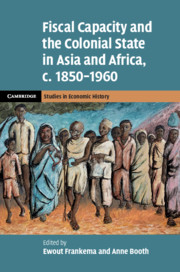Book contents
- Fiscal Capacity and the Colonial State in Asia and Africa, c. 1850–1960
- Cambridge Studies in Economic History
- Fiscal Capacity and the Colonial State in Asia and Africa, c. 1850–1960
- Copyright page
- Contents
- Figures and Maps
- Tables
- Contributors
- Acknowledgements
- 1 Fiscal Capacity and the Colonial State: Lessons from a Comparative Perspective
- 2 Towards a Modern Fiscal State in Southeast Asia, c. 1900–60
- 3 Why Was British India a Limited State?
- 4 Colonial and Indigenous Institutions in the Fiscal Development of French Indochina
- 5 Fiscal Development in Taiwan, Korea and Manchuria: Was Japanese Colonialism Different?
- 6 From Coast to Hinterland: Fiscal Capacity Building in British and French West Africa, c. 1880–1960
- 7 New Colonies, Old Tools: Building Fiscal Systems in East and Central Africa
- 8 Local Conditions and Metropolitan Visions: Fiscal Policies and Practices in Portuguese Africa, c. 1850–1970
- 9 How Mineral Discoveries Shaped the Fiscal System of South Africa
- Index
- References
6 - From Coast to Hinterland: Fiscal Capacity Building in British and French West Africa, c. 1880–1960
Published online by Cambridge University Press: 15 November 2019
- Fiscal Capacity and the Colonial State in Asia and Africa, c. 1850–1960
- Cambridge Studies in Economic History
- Fiscal Capacity and the Colonial State in Asia and Africa, c. 1850–1960
- Copyright page
- Contents
- Figures and Maps
- Tables
- Contributors
- Acknowledgements
- 1 Fiscal Capacity and the Colonial State: Lessons from a Comparative Perspective
- 2 Towards a Modern Fiscal State in Southeast Asia, c. 1900–60
- 3 Why Was British India a Limited State?
- 4 Colonial and Indigenous Institutions in the Fiscal Development of French Indochina
- 5 Fiscal Development in Taiwan, Korea and Manchuria: Was Japanese Colonialism Different?
- 6 From Coast to Hinterland: Fiscal Capacity Building in British and French West Africa, c. 1880–1960
- 7 New Colonies, Old Tools: Building Fiscal Systems in East and Central Africa
- 8 Local Conditions and Metropolitan Visions: Fiscal Policies and Practices in Portuguese Africa, c. 1850–1970
- 9 How Mineral Discoveries Shaped the Fiscal System of South Africa
- Index
- References
Summary
This chapter contrasts and compares the ways different colonial states in West Africa developed local fiscal capacity. We show that per capita revenues were higher in the more commercialised coastal export economies than in remote parts of the interior. We argue that British and French approaches to fiscal expansion differed partly because opportunities to tax trade were lower in French West Africa, where a larger share of the revenues were drawn from direct taxes, usually in combination with mandatory labour services or forced cultivation programmes. The imposition of a federal system in the French-ruled territories created tighter financial ties between the AOF and France than were seen in the British colonies, who enjoyed larger scale advantages in revenue collection based on higher population densities and lower barriers to transport and communication. Despite these differences, all fiscal regimes remained too weak to function as a solid basis for sovereign debt creation by the time of independence. This put the post-colonial states of West Africa in a precarious situation, especially when world market prices for their export commodities dropped in the 1970s, while interest rates on public debt shot up in the 1980s.
- Type
- Chapter
- Information
- Publisher: Cambridge University PressPrint publication year: 2019

